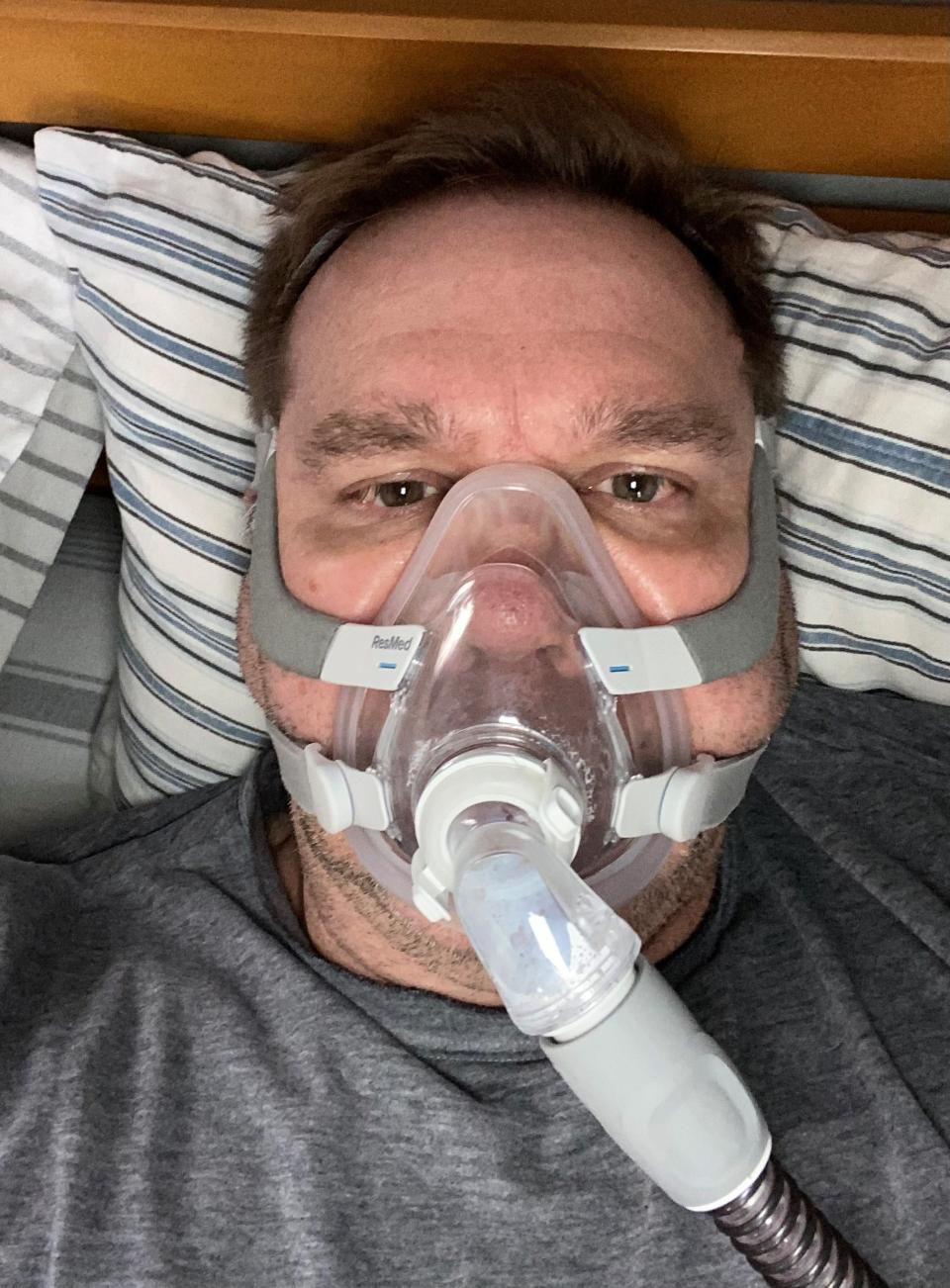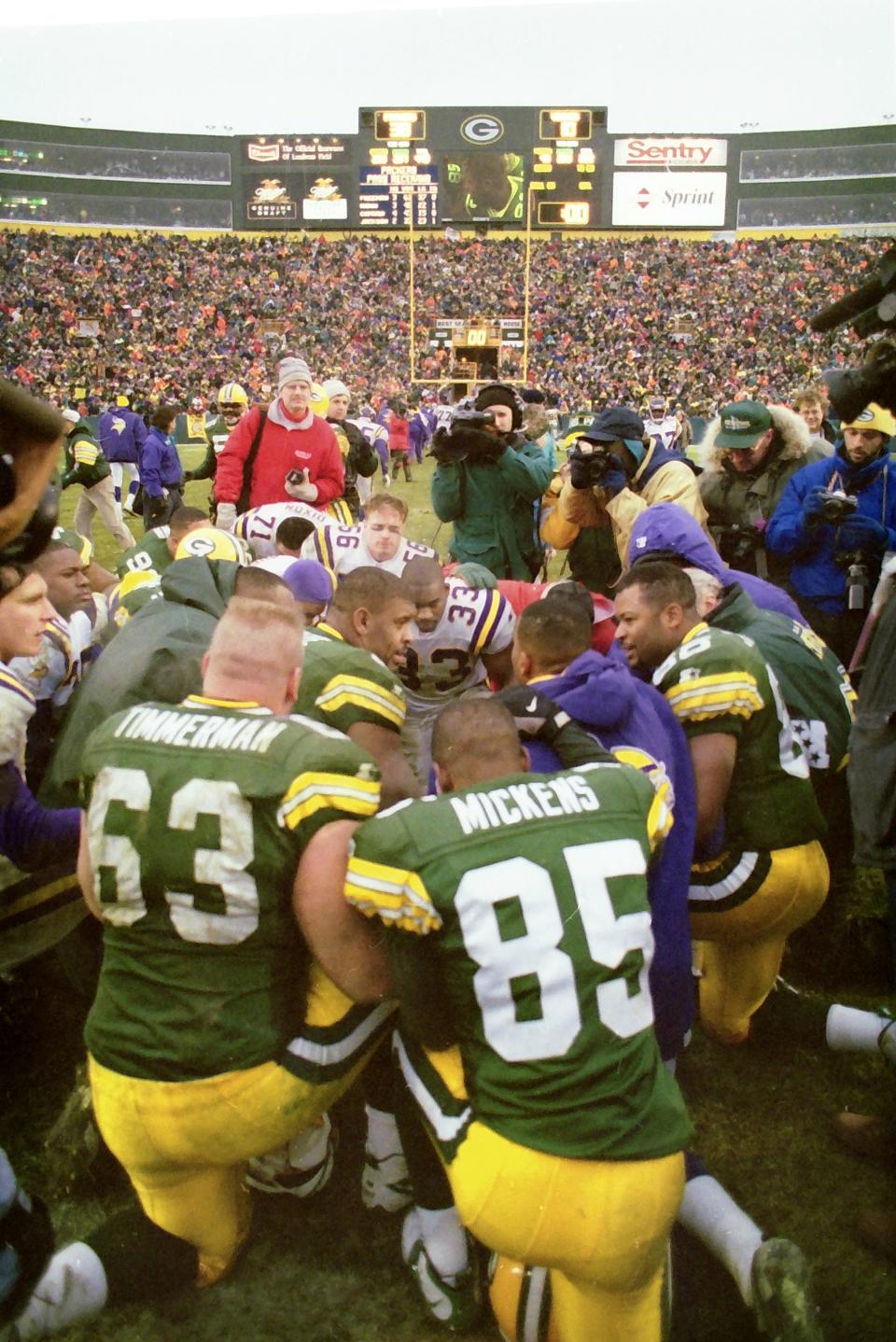Adventures with sleep apnea: How I learned to embrace my CPAP
Every night before I lay my head down to sleep, I put on a mask designed to make sure I don't stop breathing in the middle of the night.
The mask covers my nose and mouth, and I do a quick check to make sure a gushy rubber gasket makes a seal between my face and the mask. A hose connects the mask to a small machine sitting on my bedside stand. It's roughly the size of a loaf of bread and it essentially blows air into my mouth and nose while simultaneously allowing me to take deep breaths. When I do, it sounds to me a bit like a muffled version of Darth Vader. My wife says she doesn't hear it all.
The machine is a CPAP, which stands for continuous positive airway pressure, and it treats sleep apnea. Sleep apnea is a disorder that causes a people to stop breathing while they sleep, activating a survival reflex that awakens you enough to resume breathing. That means you never get into a deep sleep, which can lead to all sorts of unpleasantries.

It's an uncommon disorder, but widespread, according to the Cleveland Clinic's excellent profile of the ailment. It affects an estimated 5% to 10% of people across the world. The American Medical Association estimates that about 30 million people in the United States have sleep apnea, but only 6 million have been diagnosed with the condition.
As I look back on events and issues, I realize that it's very, very likely that I've had sleep apnea for years, if not nearly my whole adult life. (If she is reading this, my wife is vigorously nodding her head.) I dragged my feet on getting a sleep study because I really didn't feel that survival reflex working. My sleep was just fine, I told myself. I'm an early riser and an active person, a runner and a cyclist; wasn't being tired just a normal part of life?
I finally relented to get a sleep study done for a few reasons. The first is Kris, my already mentioned wife. She kept on telling me that not only did I snore quite a bit, sometimes I would stop breathing for an alarming amount of time. "It's scary!" she said. "I should time it sometime."
Another reason: Although physically fit, I carry quite a few extra pounds. I'm not officially obese, but the line is only a extra donut or frappuccino away. So a couple of years ago I took advantage of a weight-loss program offered free through my work. One of the things the program stressed was the importance getting a good night's sleep, and how it can help a person lose extra weight.
RELATED: What is sleep apnea? This sleep disorder could be the reason you're always tired.
RELATED: Why adjusting your approach to sleep could change your entire life
As I made an effort to improve my "sleep hygiene" as the program called it, I learned that people who are heavier are more likely to suffer from sleep apnea. I realized that I was caught in one of life's cruel paradoxes: I needed to sleep to lose weight, but I also needed to lose weight in order to sleep. (I assumed that my sleep apnea was caused by weight gain. That may or may not be true.)
The final reason that I agreed to get the sleep study done is my dad. He is 86 years old, in fairly poor health and requires nursing care. He's made it quite clear that he doesn't want anything to do with doctors any more in his life, but when the caregivers at a nursing home felt that he had sleep apnea and needed a sleep study done, he shockingly relented. He was diagnosed as having the disorder, and was prescribed a CPAP machine. Two weeks after using the machine, he was surprisingly stronger and seemed to be downright lively, or as lively as a grumpy retired trucker could ever be.
That was it. I relented, too. I did a home sleep study last July, and was diagnosed with a mild to moderate case of sleep apnea. Because the pulmonary unit was still playing catchup from the COVID-19 pandemic, I wasn't able to make an appointment to see a health care provider who specializes in sleep apnea until December.
The physician's assistant I saw was excellent, and she told me that she had really good news. Most of the time, she explained, she cared for people who had to be treated for a pulmonary illness. I had a chance to prevent problems by taking care of the sleep disorder.
In her notes, the PA described me as a "pleasant overweight male" with a regular heartbeat, clear lungs and edema-free extremities. She explained to me the study showed that I stopped breathing quite a bit (never felt it) and as a result, the oxygen levels in my blood fell to 86%. "We give hospital patients oxygen if their levels fall below 89," she said.
She went on to say that very bad things happen to the brain when oxygen levels decrease. It's called hypoxemia and can lead to brain damage. Other risks of not treating the apnea include arrhythmias, stroke, heart attack, heart failure and more. I could be more prone to an auto crash, for example.
Yikes. That woke me up.

And since this is Wisconsin, she also brought up the tragic death of Reggie White, the great defensive lineman for the Super Bowl-winning Green Bay Packers team in 1997. He died from a cardiac arrhythmia, and his CPAP machine was found unused next to his bed. Many experts believe the arrhythmia was partly caused by untreated sleep apnea. He was 43. I, of course, as a resident of Wisconsin, knew about Reggie White (he's my favorite Packer from that era), but now I looking at his death through a whole new frame of context.
I agreed to use a CPAP machine. I started Feb. 5 and have used it every night since, even during our warm-weather Florida vacation when my sister-in-law laughed at me when she saw me wearing it.
I don't like the CPAP machine, to be honest. I also don't like taking medications for high cholesterol levels, high blood pressure and depression. (Related? Maybe. People with sleep apnea are more likely to have high blood pressure and depression.) I view it as one of those things that happens to people, especially as they get older like me, in my late 50s. I count myself so lucky that I don't have any truly serious illnesses that can't be treated, just oddball ones that are easily treatable and allow me to live an active, vibrant life.
I don't hate the machine, either. I use it as as a going-to-sleep ritual, and I tell myself that fighter-jet pilots wear masks that look like mine and nobody laughs at them. It's not as comfortable as not using it, but it's not very uncomfortable, either. And it helps keep oxygen flowing to my brain and my heart beating regularly.
It's early days to talk about the lasting impact treating the sleep apnea has had on my life. But I can say that my running has improved. I haven't gotten any faster, but I am definitively enjoying my runs a lot more than before. That caught me a bit by surprise, because I always liked running. But it seems I get a lot more lift from running than I have in the past.
My nutritional habits have improved; I've been eating more vegetables and for the last couple of weeks, have drastically decreased my consumption of sugar and sugary desserts. I've lost a couple of pounds, I think, but I've done that before. Is it related? I don't know, but I think so. We'll see if I can summon the discipline to stick with the healthy eating habits. I mean, I'm craving a frappuccino right now.

SUPPORT LOCAL JOURNALISM: Our subscribers make this coverage possible. Subscribe to a USA TODAY NETWORK-Wisconsin site today with one of our special offers and support local journalism.
I seem to be able to focus better at work (a work in progress). I'm not nearly as tired as I used to be during the day. I stop and think to myself every once in a while, "Oh, this is what days are supposed to be like, instead of plodding along like a normal-looking zombie."
This is all good, life-changing stuff. And yeah, I absolutely wish I had done this years ago.
Features reporter Keith Uhlig is based in Wausau. Contact him at 715-845-0651 or kuhlig@gannett.com. Follow him at @UhligK on Twitter and Instagram or on Facebook.
This article originally appeared on Wausau Daily Herald: Sleep apnea risks spurred me to get a CPAP, and I'm glad I did

